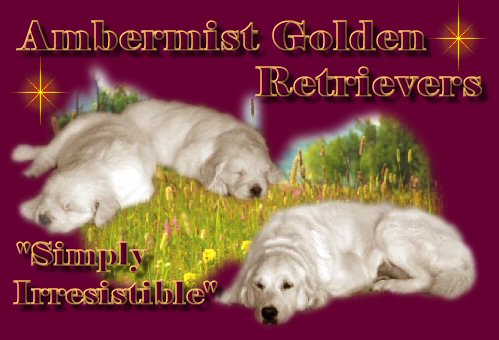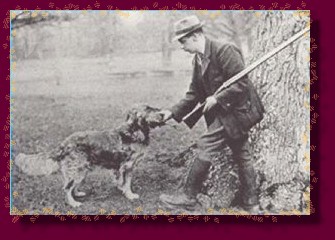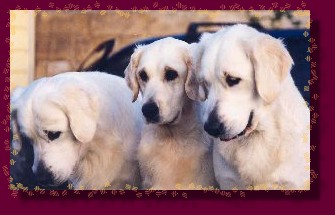



"Murray"
1998-2000
Tragically killed by snake bite.
I wish you every success in the selection of the new addition to your family and please do not hesitate to contact me with any queries you may have. I hope the following information will help you better understand the Golden Retriever and help to decide if this is the breed for you.
WHAT IS A GOLDEN RETRIEVER

The Golden Retriever was developed in Scotland and England in the late 19th Century for the purpose of retrieving wild fowl on land or water. Its physical characteristics and its willing, adaptable, trainable nature make it suitable for many purposes.
The Golden Retriever is a “natural” dog needing no surgical alterations to ears or tails, and no exotic grooming (as opposed to some terriers, poodles, etc.). Basic grooming for a Golden should take no more than 20 to 30 minutes a week.
The mature male Golden is ideally 22 to 24 inches at the shoulder, and weighs 32 to 37 kgs. Bitches, 20 to 22 inches, and weigh 27 to 32 kgs. The Golden has a normal canine structure without distortions of leg, jaw or tail. The build is sturdy and muscular, but neither massive like a Newfoundland, nor refined like a Setter. The temperament should be steady, adaptable and kind. The head is broad, with well proportioned, well set on ears, and a kind expression. The coat, which is one of the hallmarks of the breed, is a “double coat” with a thick, weather proof top coat, and a dense, soft undercoat. There are featherings of longer hair on the backs of the legs, on the front of the neck and chest, and on the tail. The adult coat may range in colour from a cream to dark gold, and the darker Golden can have a lighter feathering. A predominate colour of either white or setter red, or white markings on the head, feet or chest, are not desirable, but will have no affect on the dog’s usefulness for work or companionship.
SHOULD YOU OWN A DOG?
Dogs make wonderful companions for people of all ages but the introduction of one into the home brings with it a number of responsibilities.
Every responsible breeder and Golden Retriever Club promotes responsible dog ownership. This starts with the actual decision to bring a dog into the household. As a prospective dog owner you should question your desire to own a dog and your ability to look after it for its entire life.
We urge you to think carefully about the following questions:
a) Can you afford the money to provide:
b) Can you afford the time to provide:
c) Is your property suitable for a dog?
d) Are you prepared for the responsibilities that you are required to take on by your shire council or by common courtesy to others?
e) Do you have children?
f) Are you prepared to take on the dog for its whole lifetime?
If you have any doubts about any of the above then you need more time to consider you decision. If you think that you are prepared for dog ownership then read on.
WHAT AGE, GENDER AND BREED OF DOG IS FOR YOU?
Let’s look at the AGE first. Are you thinking of getting a puppy or an adult dog that is looking for a new home?
PUPPIES are very dependent creatures. They are also very inquisitive and, very likely to be destructive. Are you prepared for the care of a puppy? Housetraining, chewing, constant feeding, destructiveness? You may end up with some sleepless nights. Are you prepared to take the time to teach it to become a member of the family? The end result of a much loved family pet can be very rewarding but you must be prepared for some work and inconvenience along the way.

"
ADULT DOGS also bring their rewards, without the trials and tribulations of puppy hood. But, be warned, adults come with a whole range of experiences that will have shaped their behaviour. Sometimes problem behaviours only become evident in certain situations. There are many reasons why people need to re-home their pets and you should examine the situation very closely so that you have some idea of what you are getting. You must be particularly careful if you have children. A dog that has had no experience with young children for most of its life may react very badly to them. In this situation it is better to be safe than sorry.
Think about whether you want a puppy or an adult dog, carefully considering the advantages and disadvantages of each.
It is also important to decide whether you want a MALE or a FEMALE.
Like humans every dog is an individual which develops its own personality depending upon how it is reared.
Temperamentally, there is very little difference between the male and female Golden Retriever. Neither is harder to house train, and both are equally intelligent and affectionate. Both are excellent with children, and both make excellent companions. Problems of aggressiveness which males of other breeds may exhibit rarely occur in the Golden.
Sex related behaviour such as mounting and marking may be exhibited by some male Goldens, particularly if other males are present, or if the male has been used at stud. Neutering a male before 1 year of age but not younger than 8 months will not only help to alleviate these problems, but will eliminate the risk of testicular cancer, and lower the risk of prostate cancer. Since there is no responsible reason not to spay a bitch unless she was bought specifically for showing or breeding, the oestrus cycle in the female need not be a consideration.
Now it is time to consider the BREED of dog for you.
If you are tossing up between several different breeds – do a little homework on each breed.
There are 3 options open to you in choosing this person.
1. Pet Shop or Dealer – The worst possible choice. It is against each State’s Canine Association’s and every State’s Golden Retriever Club’s Codes of Ethics to sell puppies to pet shops or dealers. As a consequence, puppies sold through such outlets are likely to be poorly bred and raised. They are merchandise to be sold for a high profit.
2. Backyard Breeder - Also a poor choice. This is the person who owns a pet Golden and thinks it would be “fun” to have puppies, that it would be a great experience for the children, or that the bitch should be bred once before she is spayed. Even worse, perhaps the breeding occurred just to make money. Usually this breeder knows little about the “breed standard” or history of the breed, and still less about care. The casual breeder does not have annual eye examinations by a veterinary ophthalmologist, and does not submit hip and elbow x‑rays for scoring. The backyard breeder is not aware of breed problems, and usually doesn't care. The backyard breeder’s only goal is to produce puppies, and when the “fun” is over, sell them quickly.
3. Serious Hobby Breeder - very best choice. The serious and dedicated hobby breeder regards his/her dogs as even more than a hobby. The true enthusiast does not expect to make a profit. When someone is involved in dogs for the enjoyment of each individual animal, for participating in any of the many aspects of “dog sports”, and for the challenge of producing the finest animals possible, the result is superior. These breeders acknowledge responsibility for each and every puppy produced, and stand behind every dog they have bred.
It is an interesting fact that poor quality puppies from pet shops and backyard breeders are often sold for the same price, and sometimes even more, than those purchased from the serious hobby breeder.
Here we are looking at one breed in particular, the Golden Retriever.
WHY CHOOSE A GOLDEN RETRIEVER
RATHER THAN ANY OTHER BREED?
Firstly, find out all you can about the breed. You can check in your local library as there are several good books about Goldens, but here are some basic facts which you may find useful.
Golden Retrievers are a relatively large gundog. They have a thick coat that is made up of two layers - a short soft water resistant undercoat and a longer top coat. Hair shedding is probably the biggest problem most people face when owning a Golden Retriever – if you are not prepared to deal with this then maybe a Golden isn’t the dog for you. Colour is a matter of choice and ranges from cream to dark gold. Pigment of the nose and around the eyes should be black and eyes should be dark brown. This colouring helps to give the soft, melting expression for which the breed is renowned.
As Goldens were initially bred to retrieve game in all sorts of British terrain and to carry out that work they needed to be energetic, gentle with the game, reliable and steady. It is these traits that have led to the breed's popularity today as a family pet.
On the whole, representatives of the breed make trustworthy, easily trainable pets which fit easily into most households.
Although affectionate and cuddly, puppies can be very active, inquisitive and extremely destructive - you need to be prepared for this stage of their life. Like any dog, they need training from puppy hood to ensure that they develop acceptable social behaviour. Well socialised adults are usually eager to play, romp in the park, swim or in the ocean but are also quite content to lie quietly (on you best sofa- if they can get away with it) when not much else is going on.
Goldens have had success in all fields of canine competition - showing, obedience, retrieving, agility, endurance, tracking – so there are plenty of opportunities for owners to compete with their dog. They have also been used as aids in a variety of activities such as drug detection and for therapeutic interaction for the blind, deaf and aged.
Golden Retrievers are generally robust, healthy dogs for most of their life. There are some hereditary diseases, in particular Hip Dysplasia and Eye Defects, which can affect Goldens. Dogs with the severest forms of Hip Dysplasia will be put down at a very early age, but it can be present in varying degrees causing varying amounts of lameness and discomfort. Some eye problems can result in blindness in the young dog, while others result in progressive blindness as the dog gets older. Often there are no signs of any of these problems in the 8 week old puppy and the best way to minimise the risk of it occurring in your puppy is to make sure that the breeder has taken the precautions of breeding from dogs and bitches which have a current clear eye certificate, which have been hip scored (0-106: low scores are the best), elbow scored (0-3 for each elbow: low scores are the best).
Puppy buyers should be able to sight these certificates. Any questions about these hereditary diseases can be directed towards your prospective breeder and/or local Golden Retriever Club.
There is only a small amount of space here to tell you about the breed, but local libraries and bookshops have a variety of books on the Golden Retriever and we encourage you to do some reading. Yet there is nothing as good as first hand experience so try and see as many dogs and speak to as many owners and breeders as you can.
CHOOSING A PUPPY - MAKING AN INFORMED CHOICE

"
Probably the most important piece of advice that we can give you here is DON’T BUY ON IMPULSE. All puppies are cute and it is amazing how many people hand over several hundred dollars because “the kids wanted that one” or “my wife just couldn’t leave it there”. But there are people who breed dogs with scant regard for such things as hereditary health problems and temperament problems and who give little or no support once the dog has left their care. In the long run the price you pay for a puppy could be minimal compared with the anxiety and veterinary bills if you don’t do your homework before purchase.
It is, however, also important to realise that no puppy will come with a 100% guarantee, even the most careful breeders will experience problems from time to time.
CHOOSING A BREEDER
Talk to several breeders, owners and find those you feel you can trust and communicate with. You should feel happy that you can contact them when necessary if you require further information or if you encounter any problems with the puppy. They should be able to provide you with all the information that you need to raise the puppy and at the same time be able to stand back and let you take the responsibility.
You may find you have to wait for a puppy as many breeders only have litters from time to time. It is far better to be patient and wait for the right puppy than to get a puppy from a breeder you can’t get on with or buy a puppy that is born into conditions you are not particularly happy with – just because you have to have it NOW.
Be prepared to answer some questions yourself. Puppy placement is an important part of a breeder’s responsibilities and they will want to know about the environment into which their carefully planned puppy will be going.
Please keep in mind that rearing a litter is a time consuming business and that breeders have other commitments as well. If you make appointments try to be punctual and if you alter any of the arrangements please let the breeder know as soon as possible. Should you decide on a particular puppy it is usual to leave a deposit to secure its purchase.
CHOOSING A PUPPY

"
Generally, if you are looking for a pet, choose the puppy which most appeals to you, if it looks healthy and that you are happy with the conditions into which it has been born. Listen to the advice of the breeder – they know the temperament of the parents and they spend a lot of time with the puppies so they can see certain personality traits developing at an early age. Look at both parents if possible - they should you give you some idea of what the puppy will grow up like.
Even if you think that one in the first litter you look at is the puppy for you, don't commit yourself. Have a look at other litters if only to confirm your choice.
If you hope to compete in any field with your puppy it is a very good idea to get some advice from someone who has some experience in the field. If you want a show puppy then get experienced breeders to give you advice.
TAKING YOUR PUPPY HOME
When your pup is ready to come home (usually at 8 weeks of age but no earlier) try to pick a time when there will be someone around during the day to help him/her settle in. Establish a sleeping place that will be cool in summer and where he will be protected from the weather in winter. Be warned that expensive beds and blankets may be easily destroyed by a teething puppy.
Have drinking water available – suitable bowls are unbreakable ones that cannot be tipped up or that the puppy can not disappear into.
Health: It is important that your puppy be healthy when you pick him up. In general you should check the following before you take your puppy:
Don't be afraid to mention any doubts you have to the breeder and if you are still not satisfied, have the puppy checked by a veterinarian. Puppies are expensive items that you will very quickly become attached to, so care and effort at this stage could save you a lot, both financially and emotionally, in the future.
Vaccination and Worming: When you pick up your puppy you should receive a record of vaccinations and worming and information on future requirements. It is a very good idea to check with the breeder before any alterations to the regime recommended by the breeder are made.
Your vet should give your pup a thorough check-up at vaccination time. You vet should provide a thorough examination each time your dog has its annual vaccination.
Any serious problems should be reported straight back to the breeder. They need to know this for their breeding programs and they may also have had experience in dealing with such problems. If drastic measures or great outlays of money are involved, get another opinion. Other vets or breeders may have different experiences and therefore provide different insights into the problem.
Food: Make sure you get a feeding chart from the breeder so that you can get the necessary food before you pick up the puppy. It is essential that the puppy does not have a sudden change of diet as gastric troubles can result. If you want to feed something different, then change should be done gradually once the pup has settled in. Remember that the pup will be growing rapidly and that a good balanced diet is essential.
Papers: There are two kinds of papers that you can get with your puppy:
- the pup is registered in your name,
- the pup's registration number and
- a three generation pedigree
This is what you must get if you are buying a “registered puppy” or a puppy “with papers”. Most breeders register puppies on the “Limited Register” unless you, as the new owner have negotiated the purchase of the puppy for exhibition and/or breeding, then the puppy should be registered on the “Main Register”. The breeder should explain the different categories of registration and how to register the puppy in your name.
The regulations of your State’s Canine Association state that it is the breeder's responsibility to transfer a registered pup to the new owner and to pay the costs incurred. This may not be available when you pick up the puppy but you should have it within six weeks. If this does not happen, follow the matter up with the breeder.
You cannot show the puppy nor have a registered litter unless the puppy is officially registered in your name. Even if you have no intention of showing or breeding, make sure you still get the registration paper if you are buying a puppy "with papers". It is amazing how many people change their minds and have to go to a lot of trouble and expense to get something they were entitled to when they first bought their puppy.
References: The Golden Retriever Club of Western Australia (Inc
) and The Golden Retriever Club of New South Wales (Inc). 
This site is
best viewed with Internet Explorer v 6.0 or above and viewed with a
resolution of 800 x 600 dpi
You may not copy, reproduce, or distribute Ambermist Golden Retrievers
site design or content,
including text, graphics, or HTML, in any
form without our written consent.